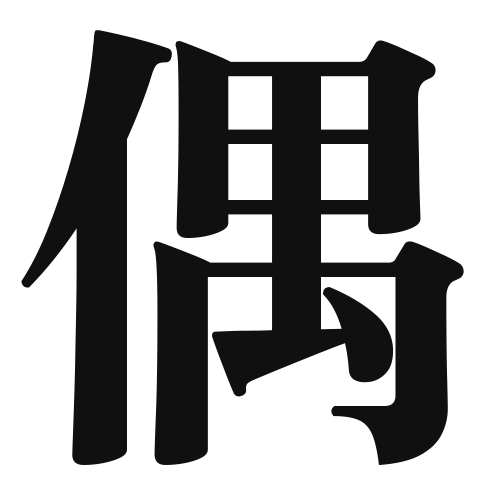1. Overview of Meaning
The kanji “偶” (gu) generally means “coincidence” or “chance.” It can also refer to “a pair” or “a couple,” often used in contexts involving two things that are together or happen simultaneously.
2. Formation and Radical
The kanji “偶” is a compound character (会意文字) that combines elements to convey its meaning. It consists of the radical “亻” (person) on the left, which indicates a relation to people, and “偶” (the right part) which suggests the idea of pairing or coincidence.
The radical “亻” is commonly associated with characters related to humans or actions involving people.
3. Examples of Usage
Common words and phrases that include “偶” are:
- 偶然 (ぐうぜん, guuzen) – coincidence
- 偶数 (ぐうすう, guusuu) – even number
Example sentences in daily conversation:
- 「私たちは偶然同じ場所にいた。」(Watashitachi wa guuzen onaji basho ni ita.) – “We happened to be in the same place by coincidence.”
- 「偶数は2で割り切れる数字です。」(Guusuu wa ni de warikireru suuji desu.) – “Even numbers are numbers that can be divided by two.”
4. Synonyms and Antonyms
Similar kanji with related meanings include:
- 偶然 (ぐうぜん, guuzen) – coincidence, which emphasizes the unexpected nature of an event.
- 対 (つい, tsui) – pair, which focuses more on the aspect of two things being together.
Antonyms include:
- 必然 (ひつぜん, hitsuzen) – necessity, which refers to something that is certain to happen, contrasting with the randomness of “偶.”
5. Cultural and Historical Background
The kanji “偶” has cultural significance in Japan, often appearing in discussions about fate and chance. It reflects the Japanese belief in the importance of serendipity in life.
Proverbs and idiomatic expressions that include “偶” are:
- 「偶然の出会い」(guuzen no deai) – “a chance encounter,” highlighting the beauty of unexpected meetings.
